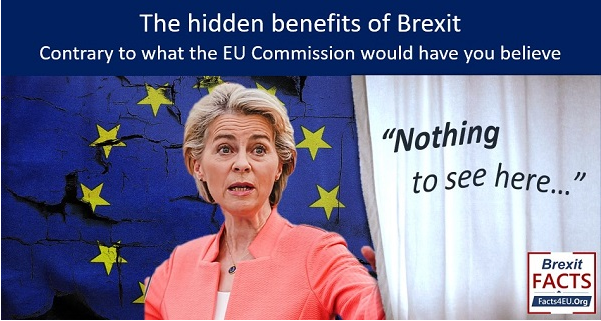Published on 11 February 2022
On the second anniversary of the UK’s leaving the EU, it was worth relecting on what had been gained, even if Theresa May and now Boris Johnson could claim very little credit for it.
Here were my First Eleven of benefits, which made up the bulk of the Facts4EU piece…
- Had we remained we would have had to raise more in taxes. We have no need to consider how to impose €10 billion per annum of new taxes between 2026 and 2030, to help the EU pay back the bonds it is issuing to enable grants of €390 billion out of its Coronavirus Recovery Fund, grants being non-refundable.
- Had we remained we would have faced a huge contingent liability on the EU Covid Fund. We have no need to factor into our own national accounts a contingent liability as guarantor for the balance of €360 billion of the Coronavirus Recovery Fund, where the money raised by the EU through bonds is on-lent to a member state but where all member states are liable for the bond repayments.
- Had we remained we would have been paying even more to the EU. We have no need to consider the risk of escalation of the UK cash contribution to the EU Budget as the UK’s GDP rises more quickly than the EU average and the UK’s historical share of the EU Budget of 12% rises, at the same time as the EU’s money requirements are increasing.
- Had we remained we would be faced with increased costs of new members. We have no need to consider the costs and other implications for the UK of EU enlargement by the addition of at least the current three candidate countries – Serbia, Albania and Montenegro – and possibly more in future.
- Had we remained we would have faced more liabilities for the EIB. We have no need to consider the new risks being taken on by the European Investment Bank group that might compel the UK to pay in more capital, for example the highly-leveraged European Guarantee Fund under which the EIB takes a first-loss position of €25 billion to enable other creditors to commit €174 billion, a ratio of 7-to-1 with, in consequence, a much higher risk of loss.
- Had we remained we would still be on the hook for Eurozone insolvencies. We have no need to be concerned about a direct cost to the UK, levied through the EU Budget, of the over-indebtedness of the Eurozone, in case one of more of the EU’s financial mechanisms became insolvent: the EU itself, the European Central Bank, the European Investment Bank, the European Investment Fund or the European Stability Mechanism.
- Had we remained we could still be liable for EU public sector insolvencies. There is now no chance of the UK being made to bail out one of the many shadow domains of EU public sector indebtedness, which are not captured by the statistics of Eurostat, such as securitisations of banks’ Non-Performing Loans, bank capital deficits, publicly-owned private companies, companies owned by multiple public entities but each with a minority share, and schemes where debt service depends on a public sector entity but under a commercial contract rather than a loan agreement.
- Having left we have completely closed the door on ever joining the Euro. We continue to benefit from having our own sovereign currency (which people like Lord Adonis still want us to join) – which ensures we have autonomy over interest rate policy, debt policy, and money supply.
- Having left we ensured we were not burdened by the EU’s enlargement and federalization agenda. The EU’s aim of bringing both new countries into the EU, and then in due course into the Euro (Croatia and Bulgaria being in the Eurozone ‘waiting room’ called ERM2) restricted both them and existing member states of sovereign powers in the interests of ‘efficiency’.
- Had we remained we would still be subject to rulings of the EU Courts of Justice. Instead we can ensure the reintroduction of a proper separation of the executive from the judiciary in our legal system as neither exists in the EU legal system (where the European Court of Justice acts as an enforcement entity for EU law-making) nor in a zone subject to Napoleonic-based law generally, which confers an advantage upon an authority simply because it is an authority and is deemed a priori to represent a superior interest – the common good.
- Having left we avoided the EU’s legal activism used to keep member states in check. We have distanced ourselves from an entity that seizes on obscure Treaty clauses as the need arises and has them interpreted by the EU Legal Service as enabling actions of the EU in new areas, where powers have not been specifically granted to the EU by member states for exactly the eventuality in question, such as EU’s attempts to find legal justification for blocking vaccine movements to the UK and for establishing the Coronavirus Recovery Fund.

